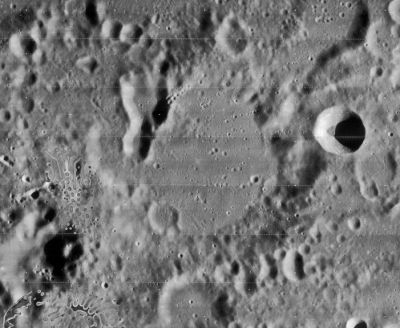Wilkins
Contents
Wilkins
|
Lat: 29.4°S, Long: 19.6°E, Diam: 57 km, Depth: 2.77 km, Rükl: 57 |

LO-IV-088-H3 A number of lettered craters named after Wilkins (and others) are visible in this view. Among these are Wilkins A (top) and B (bottom), the overlapping pair on Wilkins' northwest wall; Pons B, the fresh and deep 13-km on the right; Wilkins C, the shallow 20-km crater at the center of the bottom margin; and Zagut C, the ragged 24-km crater along the lower left edge.
Images
LPOD Photo Gallery Lunar Orbiter Images
Maps
(LAC zone 96D3) LAC map Geologic map
Description
Description: Wikipedia
Additional Information
- Data from Kurt Fisher crater depths
- Westfall, 2000: 2.77 km
- Cherrington, 1969: 1.18 km
- Satellite crater Wilkins A is on the ALPO list of banded craters
Nomenclature
- Named for Hugh Percy Wilkins (1896-1960), a British selenographer who made a lunar map with a diameter of 300" and coauthored (with Patrick Moore) The Moon - the last of the traditional Moon books. For additional information, see the extended biography.
- This feature was Catalog number 4102f in the original IAU nomenclature of Named Lunar Formations where it is noted that Goodacre called it Pons S. The "f" indicates it had not been listed in Mary Blagg's Collated List. The name Wilkins is attributed to Karl Müller.
- Kuiper reports in Table III of his Photographic Lunar Atlas (approved by the IAU) that he has modified the IAU boundary of this feature: Small "bay" on south-east not now included.
- Wilkins is one of a relatively small number of features named after living honorees.
LPOD Articles
Bibliography
The name H.P.Wilkins is mentioned in several UFO books, such as Julien Weverbergh's splendid book Ufonauten in opmars (1976), page 327, note 240: Wilkins, H. Percy: Mysteries of Space and Time. London, Frederick Muller Ltd. (C. 1955), 208 pages.
Hugh Percy Wilkins in the Sourcebook Project (William R. Corliss)
- In Mysterious Universe, a handbook of astronomical anomalies (1979) :
- Page 172: Lunar Crescent and Bright Rim (Journal of the British Astronomical Association, 1946)
- Page 204: Three Riddles of Plato (Jackson T. Carle, Sky and Telescope, 1955)
And... who was William Wilkins? (see page 223 in the article Lights on the Moon by Stanley C. Ogilvy, Popular Astronomy, 1949)